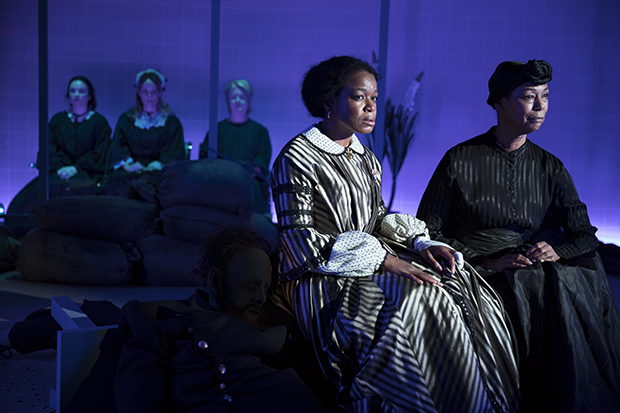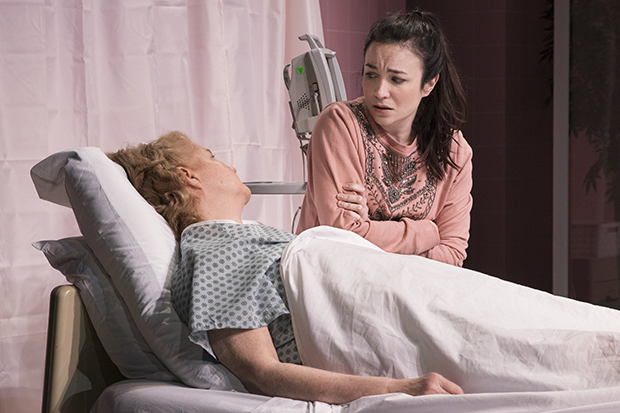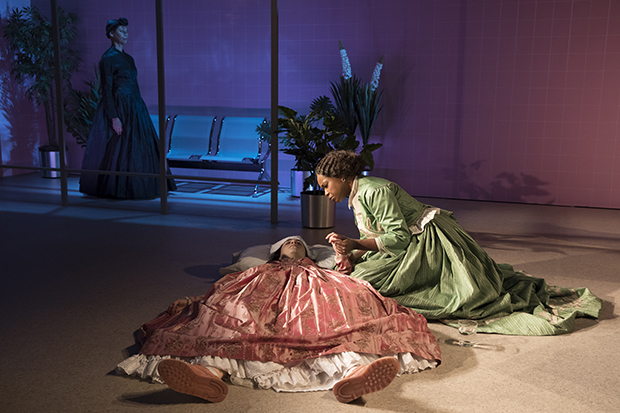Marys Seacole and the Black Female Caretakers Who Make the World Go Round

(© Julieta Cervantes)
Over a century after her death, Florence Nightingale is still celebrated for her pioneering work as a nurse. Less known is Jamaican-born nurse and businesswoman Mary Seacole, despite the fact that both women braved the battlefields of the Crimean War. Jackie Sibblies Drury gives the latter a powerful and arguably long-overdue tribute in Marys Seacole, now making its world premiere at LCT3. Drury vividly introduces American audiences to Seacole, tying her to a long tradition of black and brown women caring for vulnerable people who are not their kin.
One need only take a stroll through Central Park on a spring afternoon to witness Caribbean nurses tending to the elderly, and Caribbean nannies minding the young, to see how that tradition persists to this day. Drury depicts Seacole (the incomparable Quincy Tyler Bernstine) treating cholera patients in Kingston and dodging cannon fire in Crimea. But she also imagines other Marys working in a modern eldercare facility and watching white children from a park bench. Contemporary and historical scenes bleed together, staging a rich continuum in just 90 minutes.
It's breathtaking to behold, but it's unsurprising coming from Drury, whose Fairview brilliantly mixes historical insight with contemporary social commentary (that play will return to New York this summer). Drury tempers her perspicacity with surefire wit that will keep you laughing as the light bulb goes off in your brain.

(© Julieta Cervantes)
A particularly humorous scene casts Mary as the head instructor in a nurse-training program. She directs actors in the simulation of a mass shooting, while assessing overwhelmed trainee Mamie (Gabby Beans) on her ability to perform triage in a crisis. As the blood packets fly, Bernstine radiates disappointment as Mary, building up her own magnificence as she cuts down the younger woman coming up behind her.
The love-hate chemistry between Bernstine and Beans forcefully conveys how "tough love" (and abuse) is passed down like an heirloom from one generation to the next. But every actor in this cast of six women contributes to the complex ecosystem of Marys Seacole: Ismenia Mendes is hilarious as Miriam, a younger white woman who always seems to be in need of rescue. Lucy Taylor plays Florence Nightingale with an icy sneer (her back-and-forth with Mary is a master class in passive-aggression). Taylor also plays May, a woman who compensates for her guilt around placing her mother (a convincingly catatonic Marceline Hugot) in a long-term care facility by harassing the staff. The menacing Karen Kandel plays Duppy Mary, the only character that seems to really rattle Mary; and we completely understand, because she scares us too.

(© Julieta Cervantes)
Director Lileana Blain-Cruz delivers well-choreographed pandemonium that sacrifices nothing in terms of clarity. Her work in the second act is especially impressive as lines from the first act return in a fugue of memory, abuse, regret, and perseverance. In several minutes, we witness the entire history of Mary, and how she became the fiercely entrepreneurial, slightly abrasive, yet relentlessly compassionate person we met in the first act.
Mariana Sanchez's set of pink tiled walls and antiseptic floors immediately conjures a hospital, but it easily transitions into other spaces under Jiyoun Chang's focused lighting. Palmer Hefferan's enveloping sound brings the front lines of Crimea into the theater, but it also contributes to Drury's playfulness (at one point, Mary lip-synchs to Whitney Houston's "I'm Every Woman," which Bernstine pulls off like she's been doing it for years). Kaye Voyce's detailed period costumes provide the most visible manifestation of era, while also providing for quick transitions in this play in which time is no barrier to telling a good story.
Mary Seacole may have been an exceptional woman, but Drury makes the case that the Marys who toil among us in 2019 aren't far off: These immigrant women have internalized the harsh gospel of American capitalism despite the ways in which that system disadvantages them. Few of them are likely to end up with statues (as the historical Mary Seacole now has), but they do now have one hell of a play.










